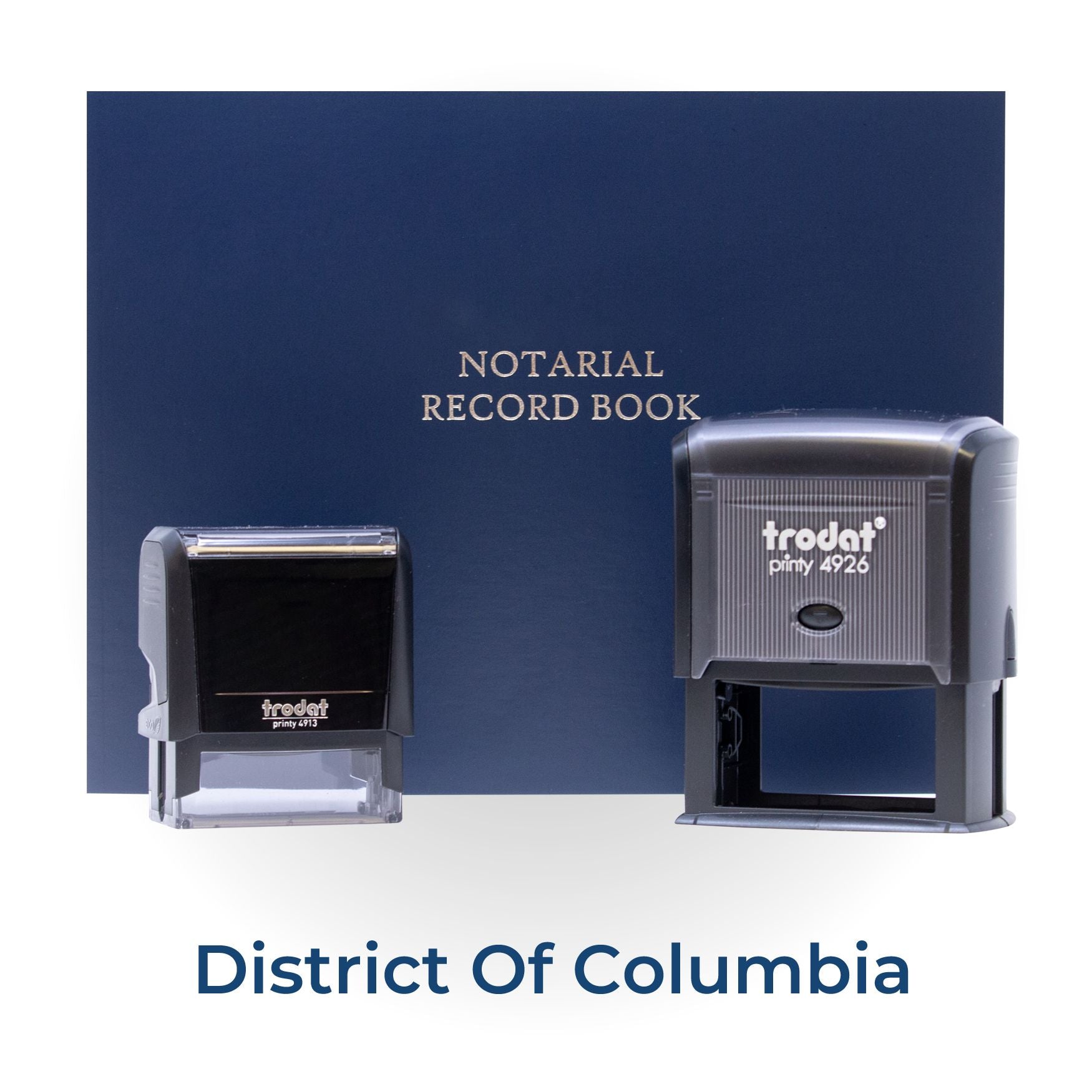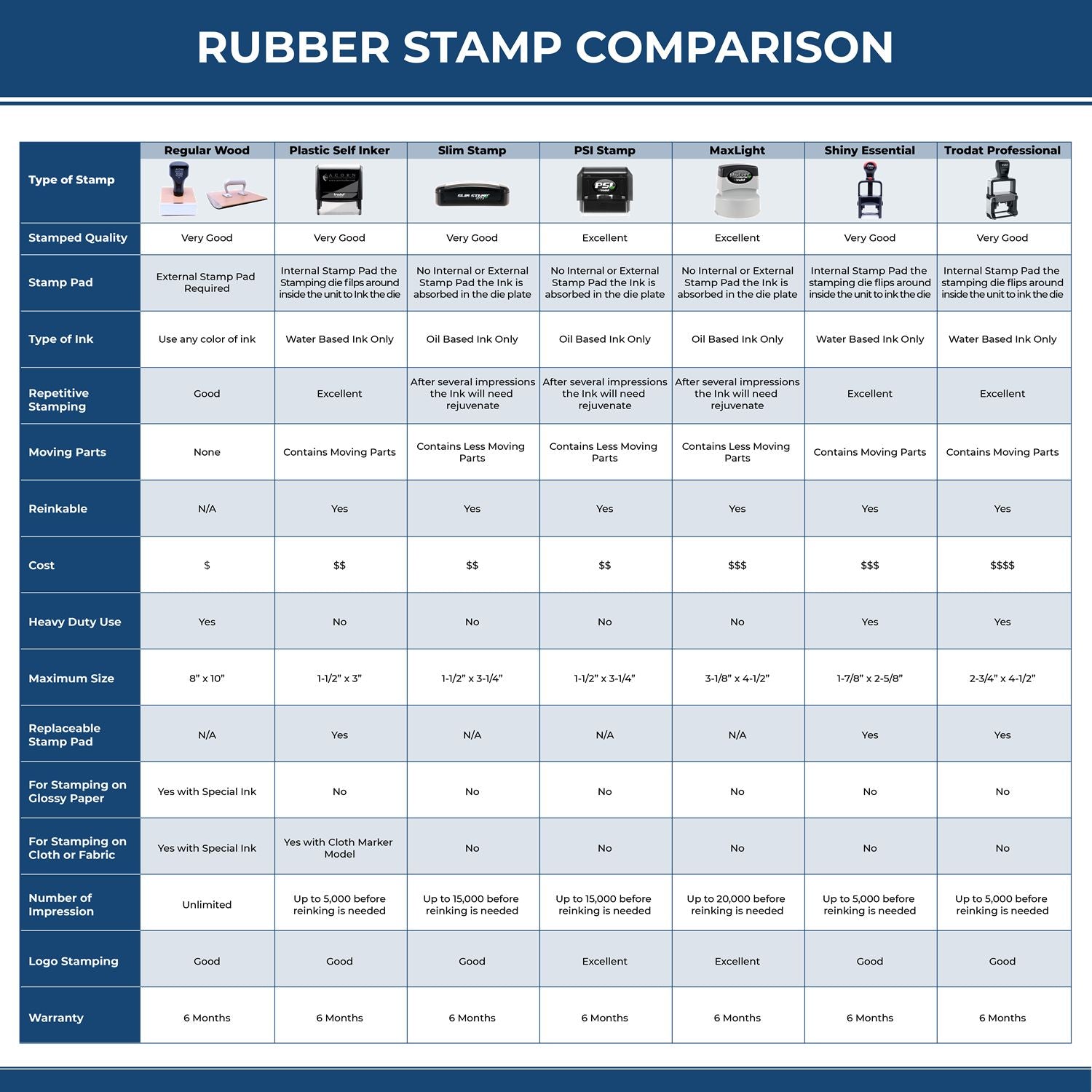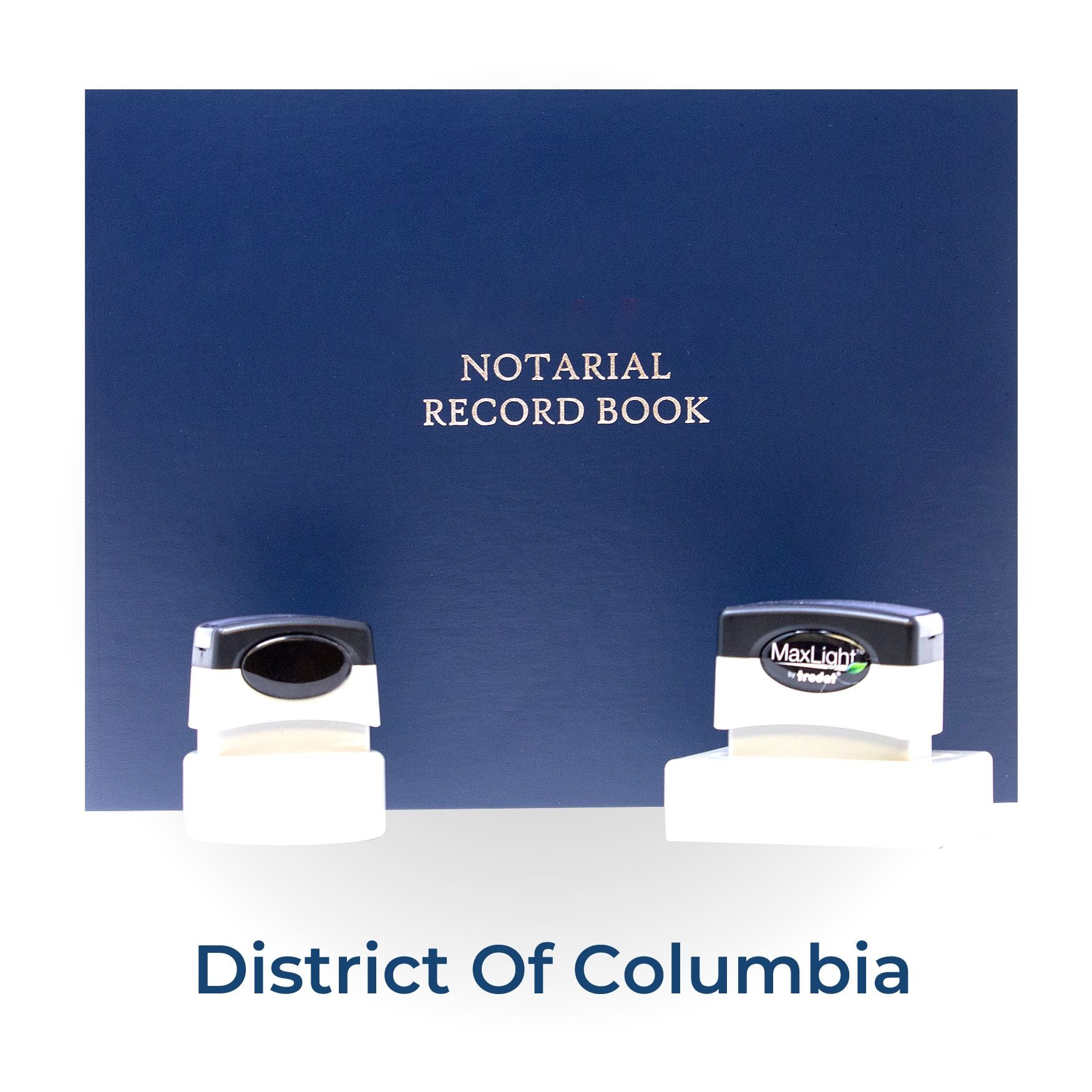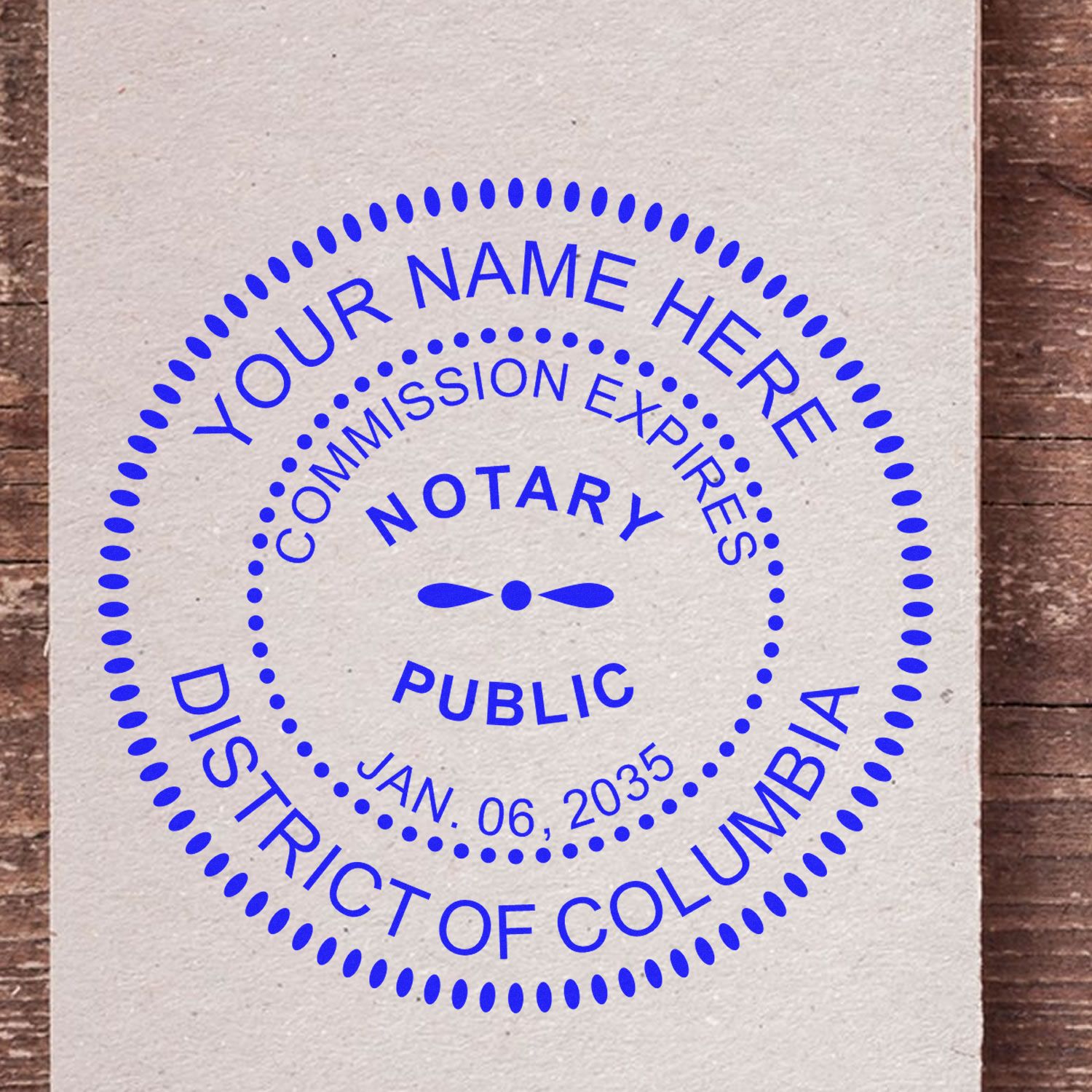Understanding the requirements for your District of Columbia notary seal and stamp can feel daunting at first. After all, a notary’s responsibilities are crucial for upholding document integrity. With the right knowledge, though, you’ll be able to pick the best supplies and ensure your notarial acts go smoothly. In this post, we’ll look at the essential elements of the notary process in the District of Columbia, compare various seals and stamps, and offer practical tips for storing and caring for your tools. By the end, you’ll feel more confident about what to purchase, how to use it, and where to find support if needed.
Explore District Requirements
Every state or district sets specific guidelines for its notaries, and the District of Columbia is no exception. Understanding these regulations clarifies which elements must appear on your seal or stamp whenever you notarize documents.
- Required details usually include your name as commissioned, your commission expiry date, and the words “Notary Public” and “District of Columbia.”
- Some jurisdictions also require the notary’s commission number. In DC, check your local commission guidelines to verify whether this is mandatory.
The best advice is to always be certain your seal or stamp matches official requirements. Mistakes here can cause serious issues, such as invalidated documents or disciplinary action. When in doubt, consult District of Columbia notary rules directly or ask a trusted dealer for precise guidance.
Recognize Essential Document Elements
In addition to using the right notary seal or stamp, your signature and notary journal are vital. Many notaries keep a log stating what was notarized, when, and for whom.
- A typical notary journal entry includes the signer’s name, type of document, and any fees you charged.
- If your district requires thumbprints for certain transactions, be sure to keep an ink pad handy.
By maintaining detailed records along with properly stamped or sealed documents, you safeguard yourself from disputes. It also shows you respect professional best practices and the trust people put in your notarial services.
Compare Notary Seals And Stamps
In the District of Columbia, using a seal or stamp is a must, but many notaries wonder which style is best. Should you choose a rubber stamp or an embosser? Or maybe a self-inking model? Each type has its perks, so let’s compare with a quick-reference table.
| Seal or Stamp Type | Appearance | Pros | Cons |
|---|---|---|---|
| Embossing Seal | Raised impression, often visually striking | - Professional look - Harder to tamper | - Can be tricky to photograph or scan |
| Self-Inking Stamp | Inked impression, self-contained ink mechanism | - Fast and neat - Minimal ink replacement | - May fade over time, needs re-inking |
| Pre-Inked Stamp | Inked impression, less messy but requires re-inking | - Crisp detail - Lasts for thousands of uses | - Higher initial cost than self-inking |
When deciding on a seal or stamp, think about your workflow. Embossing tools look impressive, yet they can be a bit challenging if you regularly need digital copies (since raised impressions sometimes scan poorly). On the other hand, a self-inking stamp is fast and convenient, but eventually requires fresh ink to keep impressions bold.
Find Your Trusted Supplier
Choosing a reliable vendor makes all the difference in receiving high-quality seals and stamps that meet District of Columbia rules. One popular option is Engineer Seal Stamps, a trusted supplier for District of Columbia Notary Supplies, District of Columbia Notary Stamp, and Seals. With over 60 years of experience, they offer:
- Detailed knowledge of local notary requirements
- Quick service to ensure you get your items when you need them
- Free digital stamp with every purchase
- Quality products made to last
Professional support counts when you’re responsible for authenticating legal documents. If you need more confidence about your purchase, consider talking with other notaries or checking references for vendors online.
Keep Your Tools Maintained
Once you’ve selected your seal or stamp, you’ll want to care for it properly so it stays in tip-top shape:
Store in a Cool, Dry Place
Extreme heat, moisture, or direct sunlight can degrade rubber stamp pads and warp embossing devices. If your notary kit stays in your bag all day, consider a small protective case or pouch for added safety.Re-Ink Regularly
For self-inking or pre-inked stamps, keep an eye on how light your impressions become. Subtle fading is your cue to re-ink. Follow the manufacturer’s instructions to avoid over-inking and potential leaks.Handle With Care
Embossers have moving parts that clamp your document for a crisp imprint. Avoid forcing them on thick materials like heavy cardstock, which can strain or misalign the embosser’s metal plates.Test Periodically
Before stamping a vital document, stamp or emboss a scrap piece of paper to ensure the impression is sharp and includes all mandatory text.




By caring for your notary tools properly, you ensure each impression is both legible and professional. This step might feel obvious, but you’d be surprised how many notaries run into trouble with neglected ink levels or damaged seals!
Discover Convenient Supply Packages
Having the right supplies in one neat bundle can free you from scrambling around multiple stores or websites. For example, District of Columbia Notary Supplies typically bundle together everything you need at a reasonable price.
Packages often include:
- Your primary notary seal or stamp
- A spare ink pad or re-inker
- A notary record book or journal
- An educational pamphlet summarizing DC notary laws, if available
Bundled kits help you avoid purchasing items one by one, which conveniently cuts your overall shopping time. Plus, you can sometimes snag discounts by buying supplies all at once rather than separately. If you’re new to being a notary, having a single box arrive with everything you need can feel like an instant nerve-soother!
Make The Most Of Commission Renewal
As you know, notary commissions in the District of Columbia must be renewed. When renewal time comes around, it’s often the perfect moment to refresh your notary seal and stamp. Over time, even the sturdiest embosser or highest-quality stamp sees wear and tear.
- Look at the readiness of your existing stamp. Is the handle broken or does the etched lettering appear faint?
- Confirm if your new commission details (like an updated expiry date) require you to purchase a new notary tool.
- Take advantage of renewal promotions. Some suppliers offer discounts or package deals when you replace your stamp or seal along with renewing your commission.
If you time your renewal right, you’ll never have a gap in your notary services. This thoughtful approach provides plenty of breathing room to get your new supplies shipped, test them out, and walk into your next appointment with confidence.
Understand The Importance Of Clarity
Your notary seal or stamp is all about clarity. Clients rely on notaries to offer an official mark that’s easy to read and leaves no doubts regarding authenticity. Here’s why clarity matters so much:
- A crisp impression prevents confusion: People can clearly see your name, official title, and commission information.
- Courts and agencies often examine the stamp if a document is questioned. A smudged seal can invite suspicion into the validity of your notarization.
- When scanning or photocopying, a blurred seal or extremely faint stamp might get lost in the process, which reduces trust in the document’s authenticity.


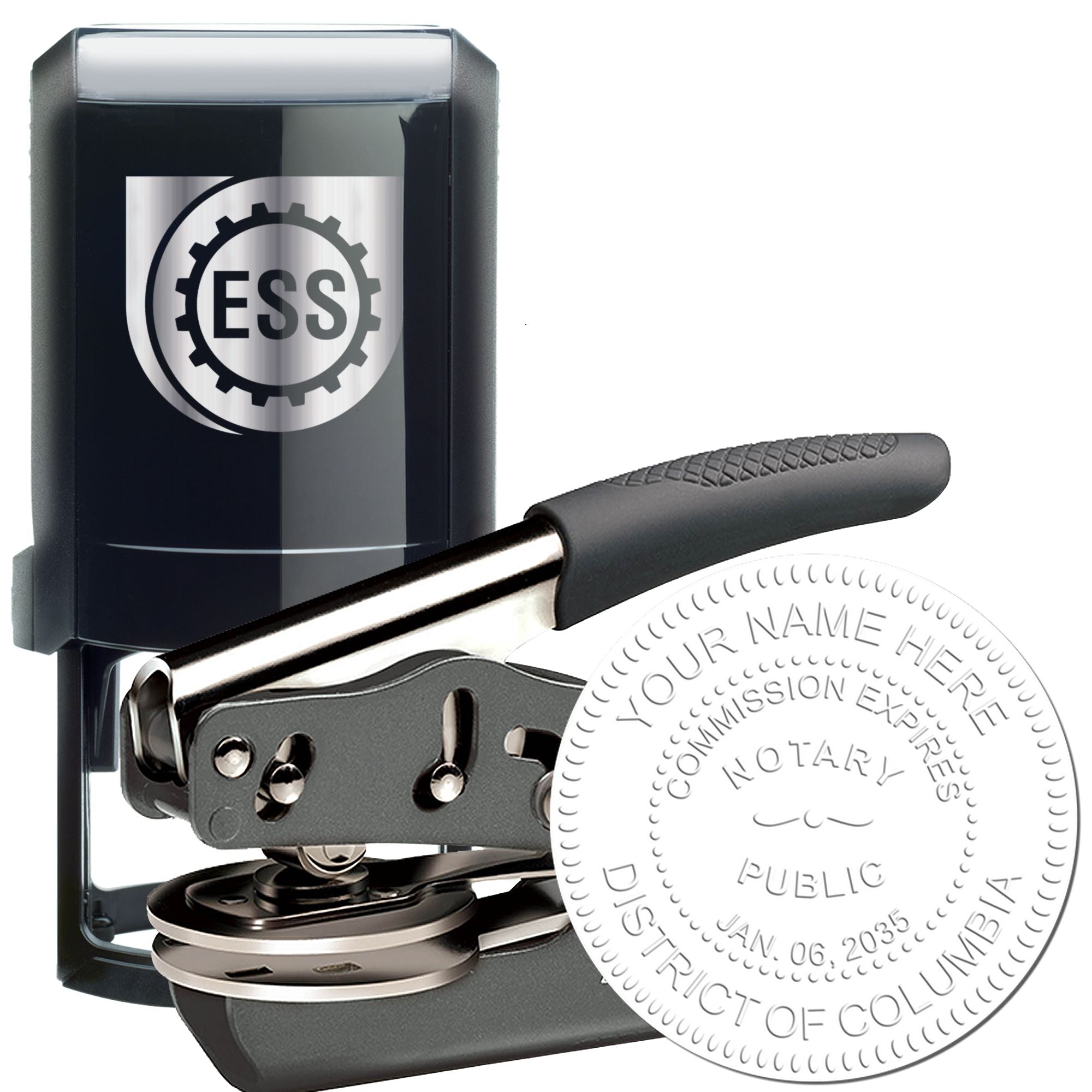
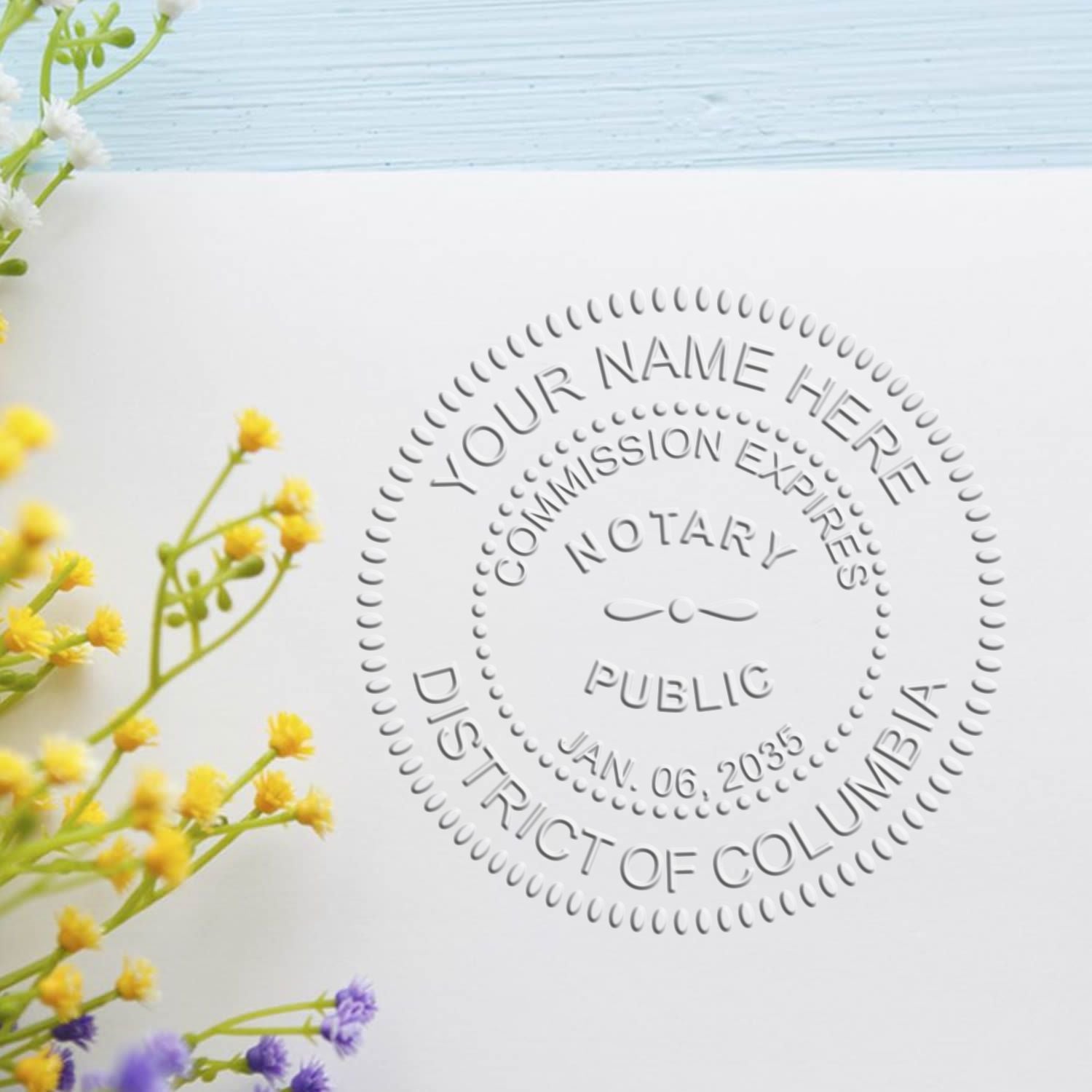
If you notice your impressions are less defined or uneven, it’s time to service or replace that tool. Promptly addressing these issues keeps everything above board and ensures total clarity for your clients and for legal purposes.
Check Any Special Situations
Sometimes you might need more than just the everyday notary stamp. For instance, if you handle real estate documents or mortgage closings, you may be required to own multiple stamps or have a backup embosser. Each organization can have its own guidelines. While the District of Columbia sets broad requirements, certain industries add layers of detail.
You might find that your notary clients request a particular style (embossed or inked) so the resulting document suits their preferences or meets a lender’s rules. In these instances, keep communication open. Knowing your clients’ preferences in advance helps you plan more effectively. Having at least one reliable backup can also be a lifesaver if your primary tool acts up mid-appointment.
Prepare For Digital Requests
While traditional notarizations rely heavily on an in-person act, you may find that remote or electronic notarization is gaining popularity. Some states permit remote online notarization (where you verify identities through video calls), and in certain cases, you might need to present a digital notary seal.
- Remember that District of Columbia guidelines for online notarization could differ from in-person rules.
- Check if you need a digital certificate or e-seal for these remote sessions.
- If your local rules allow, storing a secure digital stamp can speed up your remote tasks.
Many notaries prefer a hybrid approach. They use an embossing seal or physical stamp for face-to-face signings, then pivot to a digital seal for those online sessions. Over time, this flexibility can boost your business, especially if you’re dealing with tech-savvy clients. Engineer Seal Stamps offers a free digital stamp with purchase, which makes it easier to dip your toes into these modern notarization methods.
Explore Engineer Seal Stamps Advantages
Engineer Seal Stamps has served notaries for decades. Their commitment shines through in several ways:
- Over Six Decades of Expertise: With 60 years in the field, they’ve seen how regulations change and can guide you to the right product for the District of Columbia.
- Reliable Quality: Their embossers, stamps, and accessories are made for professional results. You can trust that what you’re ordering will align with DC’s specific notary standards.
- Quick Service: Need your supplies in a rush? They focus on speedy processing so you’re not left waiting.
- Free Digital Stamp with Purchase: They realize many notaries juggle physical and electronic notarizations. Adding in a digital stamp ensures you’re prepared for any scenario.
By picking a company that understands the nuances of DC notary laws, you’ll worry less about compliance details and more about the broader tasks of managing your business or assisting your community.
Combine Convenience And Professionalism
In the District of Columbia, it’s more than just using the correct seal. You’re also building a reputation for professionalism. If your stamp or seal is messy, out-of-date, or incomplete, it can undermine trust just as quickly as skipping required paperwork. Keep the following reminders handy:
- Double-check your impressions every few days. If you’re stamping in lower light, it’s easy to miss minor flaws.
- Consider having a spare on hand. A simple additional stamp or embosser might save you on a busy day if the original malfunctions.
- Communicate with your customers. If you see confusion about the notarial act, walk them through the significance of your seal or stamp so they understand the importance of authenticity.
Emphasizing both convenience and professionalism sets you apart. Clients love a notary who can quickly produce the right documents, handle their concerns, and maintain impeccable seal impressions.
Plan Ahead For Cost Savings
Anyone licensed to notarize in the District of Columbia eventually invests in new supplies, whether at the start of their commission or over time. Here are a few pointers for keeping costs under control:
- Look for package deals that include a notary stamp, seal, and additional supplies like journals or ink refills.
- Sign up for email lists to catch promotions, especially around popular renewal times when suppliers might give discounts.
- Factor in shipping costs and delivery times. Sometimes a small business day delay could make a big difference if you have urgent appointments. Quick-turnaround suppliers might be worth the slight extra fee.
Your best bet is balancing budget with excellent product quality. Cheaper tools that degrade quickly could cost more in the long run if you have to replace them sooner.
Bring It All Together
Choosing and using a District of Columbia notary seal and stamp is about more than just making a mark on paper. It means practicing diligence, adhering to local rules, and showing commitment to professionalism. By selecting high-quality notary tools, maintaining them well, and understanding how to apply them properly, you’re poised to create a trustworthy impression every time you notarize a document.
Before you finalize your choice, consider what your day-to-day needs look like. Are you frequently on the road? Do you require a second stamp for backup? Which ink color works best for your standard documents? These practical questions guide your ultimate decision.
When you’re ready to explore more specifics, you can visit District of Columbia Notary Supplies to see bundled packages or talk to professionals at Engineer Seal Stamps. They’ll help you finalize the perfect fit for your commission.
Frequently Asked Questions
What If My Embosser Stops Working Properly?
It’s best to stop using a damaged embosser immediately. Inspect for misalignment, bent parts, or wear around the die. If repairs aren’t possible or practical, replace it as soon as you can to maintain crisp, valid impressions.Can I Use A Handheld Embosser And A Stamp?
Yes. Many District of Columbia notaries keep both at hand. A handheld embosser provides a raised, professional look. Meanwhile, a self-inking or pre-inked stamp ensures quick, clear marks on documents requiring multiple copies.Do I Need A Digital Stamp For Online Services?
It depends on whether you plan to perform remote online notarizations, which are subject to district-specific rules. If you do, having a secure, digital notary seal can be essential. Engineer Seal Stamps offers a free digital stamp with purchase, so you’re all set without extra hassle.How Often Should I Replace The Ink Pad?
Watch for signs of fading or incomplete lines in your impressions. If the text on your stamp starts to appear lighter or patchy, it’s time to either re-ink or replace the pad. This keeps every impression crisp and compliant with District of Columbia standards.
Making informed decisions on your notary supplies ensures your customers experience professional, legitimate notarizations every time they seek your help. With an understanding of the District of Columbia’s requirements, a grasp of common seal and stamp options, and a dependable partner like Engineer Seal Stamps, you’ll be ready to handle any notarial challenge that comes your way. Feel free to explore the extensive product range, ask questions, and keep leveling up your notary game. After all, clarity and authenticity are the cornerstones of notarial success!






